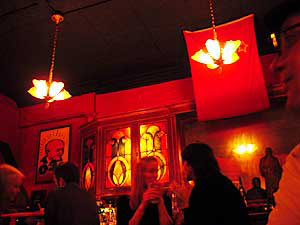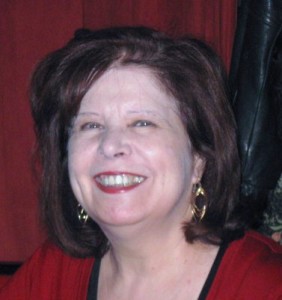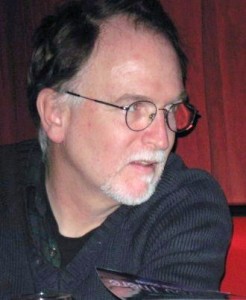By Mark L. Blackman: On the bone-chilling evening of Wednesday, November 19 the Fantastic Fiction Readings Series hosted readings by authors Nancy Kress and Jack Skillingstead (who, despite having a similar-sounding name, is not the guy from The Nightmare Before Christmas). (For those who don’t know, in addition to sharing this reading, the two share a life; they have been married since 2011.)
The Series, co-hosted by award-winning editor Ellen Datlow and Mathew Kressel, monthly presents readings both by eminent speculative fiction writers and up-and-coming future luminaries of the field, though it has a different feel from the New York Review of Science Fiction Readings. Its venue, the KGB Bar in Manhattan’s East Village, is known for its red walls and Soviet era-themed décor. (To the New York Dept. of State it’s the Kraine Gallery Bar.) Up a steep and very narrow stairway, dark and dimly-lit, depending on one’s leanings, the bar is cramped – the room (cleverly called the Red Room) is usually SRO within minutes of opening – or cozy. But the crowd is always fascinating, drinks are reasonable, and readings are always free. (As it happened, I shared a table with Nancy’s sister Kate, and, for a brief time, at the next table was a non-sf fan/reader who had just stopped into the bar for a drink and was somewhat mystified by our gathering.)
The event opened with Datlow, taking a break from photographing the crowd, welcoming the audience and announcing upcoming readers: On December 17, the readers will be Rajan Khanna and Steven Gould, on January 21, 2015 Gregory Frost and Andy Duncan, on February 18 Mike Allen and Ben Loory, on March 18 Caitlin Kiernan, and on April 15 James Morrow and Ken Liu. She then introduced the first reader of the evening.
Nancy Kress is the author of 33 books, including 26 novels (The Sleepless Trilogy among them), four collections of short stories and three books on writing, work for which she has won five Nebula Awards, two Hugo Awards, a Theodore Sturgeon Memorial Award and the John W. Campbell Memorial Award. Her most recent book, Yesterday’s Kin, a standalone novel from which she read, is about genetic inheritance, a common theme in her fiction. Genetic engineering, she observed in prefatory remarks, is the wave of the future, as well as fascinating to her personally. (For the novel, she researched mitochondrial DNA.) In her selection, an evolutionary biologist is drafted by the FBI to join a UN team of specialists to analyze an expedition of aliens whose ship, or “Embassy,” is floating in New York Harbor. The aliens, called Denebs, even though they are not from that star (perhaps it’s analogous to Columbus dubbing the natives Indians), are reclusive, not emerging and communicating only by radio that they’ve come in peace to contact humanity. (One hopes that their mission is not to serve Man; the title might be a clue to their identity.)
After a short intermission, Kressel took the podium to introduce the second and final reader. Jack Skillingstead has published more than thirty stories (among them a Theodore Sturgeon Memorial Award finalist), which have appeared in various magazines, Year’s Best volumes and original anthologies, and two novels; one, Life on the Preservation, was a finalist for the Philip K. Dick Award. He read from his collection of short fiction, Are You There and Other Stories, “the best story that can be read in 20 minutes,” “Everyone Bleeds Through.” No one timed him; he held the audience rapt with the enthralling story of a driver whose hitchhiker turns out to be otherworldly, from a reality that has “bled through” to ours.
Books by both readers were for sale at the back of the room from the Word bookstore in Brooklyn. Afterward, an expedition headed out for Szechuan dinner.
Discover more from File 770
Subscribe to get the latest posts sent to your email.



